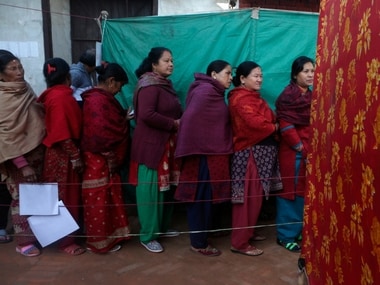The Cyclone Ockhi rehabilitation package announced by Kerala’s Left Democratic Front (LDF) government considers only the direct victims of the tropical disaster. It is silent on the possible loss of livelihood of thousands of fishermen, who eke out a living from the sea, due to the damage it may have caused to the marine biodiversity.
Preliminary studies by the University of Kerala showed that Ockhi had caused damage not only on land but also underwater. The study conducted by the department of aquatic biology department of the varsity in collaboration with Bond Safari Kovalam, an underwater adventure company, showed that the cyclone had caused widespread damage to marine biodiversity.
The study conducted with the help of scuba divers of the private firm showed extensive damage to the coastal biodiversity. Dr Biju Kumar, head of the department, said Ockhi had destroyed 80 per cent of the mussel colonies in Kovalam, one of the worst-hit areas in the state.
The mussel beds clinging to rocky reefs four to seven meters below the ocean surface are very high in marine biodiversity. These are food for people and also serve as microhabitat for many other species, including many lesser known varieties. Mussels have a high demand in Kerala, Karnataka and Goa.
Biju told Firstpost that underwater photographs and video footage taken by five scuba divers of Bond Safari showed devastated mussel colonies and barren reefs. The impact of Ockhi documented with time scale data by Bond Safari showed catastrophic changes, with total replacement of mussel beds, in all the exposed regions.
The aquatic expert said the cyclone had also devastated the entire coastal fishing in the area. Besides mussels, Kovalam and neighbouring areas are also known for conches and many rich varieties of ornamental fish. These fishermen will also have to bear the brunt of the cyclone for a long time to come, as resuscitation of the coast will take time.
“The mussel beds that suffered the biggest damage are part of a unique ecosystem found off the Thiruvananthapuram coast, which are dominated by rocky structures, seaweeds and corals. Interspersed by rocks, platforms, cobbles, pebbles and boulders, they provide an ideal platform for the rich coastal biodiversity,” says Jackson Peter, managing director of Bond Safari, who led the underwater observation.
He told Firstpost that the area was an important source of food and nutrients for members of neighbouring terrestrial and marine ecosystems. They also serve as an important nursery area for many fish and crustacean species.
The coastal biodiversity in the region is already under strain from development activity and pollution. While tourism has already claimed large swathes of the once thriving fishing village, the construction of a new international seaport at Vizhinjam has done irreparable damage to the marine ecosystem.
A study on the impact of the developmental activity in the region by Valiyathura-based research group Friends of Marine Life (FML) showed that dredging for the seaport alone had caused extensive damage to the marine ecosystem in a seven kilometre stretch covering Vizhinjam, Kovalam and Mulloor.
A report on the study in the New Indian Express said the port-related construction works, especially dredging, had brought most of the near-inshore underwater reefs along the seven-km stretch under mud destroying the mussel colonies and barren reefs.
According to the report, there are 33 near-inshore underwater reefs along the stretch. It is also the main mussel zone in this part of the coast. Ten to 12 reefs, mostly in Vizhinjam and Mulloor, are already under mud now. All the rocky reefs have become empty of life forms, the report quoted Robert Panipilla, the researcher and FML convenor, as saying.
“We have lost a large extent of rich mussel beds due do sedimentation caused by the port building. The remaining healthy patch of mussel beds is now replaced due to the high energy waves created by the cyclone,” says Jackson.
Apart from dredging, the indiscriminate dumping of city waste in the sea has also done lot of harm to marine life forms. These activities will have serious repercussions for the local communities who depend on mussel collection for their livelihood for years, says Jackson.
He said that it was important to document the impacts after the cyclone in order to adapt with such instances in future. A study of species recovery and succession in the affected area would be ideal as India has lesser experience in this area.
“Scientifically the majority of species belonging to rocky shore communities have extensive geographical ranges. However, specific communities associated with specialised hard structures such as laterite rocks along Kerala coast are habitats of specialised biodiversity”, says Jackson.
Experts have demanded comprehensive studies to understand the extent of the destruction and its impact on the marine biodiversity. Biju Kumar has additionally called for bringing the fishermen affected by the cyclone devastation under the ambit of the rehabilitation package.
“I request the government of Kerala to order a study to understand the destruction caused to the marine biodiversity and roll out a proper rehabilitation package to people who are directly affected by the damage in the underwater,” he said.
The government has not taken into account these people who will have to bear the brunt of the cyclone in the longer run while preparing the rehabilitation package. The package is based on damages caused on the land. But it should also take into account those affected by the changes underwater, he added.
Incidentally, the Latin Catholic Church, which represents the fisherfolk, has rejected the package and has called for an agitation from Monday. Thiruvananthapuram Archdiocese Father Eugene H Pereira said the package prepared without consulting the fishermen had not taken into account the long-term impact of the calamity.
The Church has demanded the declaration of Ockhi as a national disaster and rehabilitation under its provisions. The Church leaders have threatened to carry the dead bodies to the secretariat if their demands are not accepted by the government.
The government is trying to avert such an agitation as it may fuel passions. The situation in the affected area is still tense with the search by various agencies for the remaining fishermen stranded in the sea not yielding much result. The ministers, including chief minister Pinarayi Vijayan, faced the wrath of the fisherfolk when they visited the affected areas.
The ministers are trying to assuage the feelings of the Church leaders. Two ministers have already met Archbishop Soosaipakyam and assured him to give due consideration to the demands made by the Church, which include using the experience of the fishermen in recasting the rehabilitation package.
The state government, which had bungled in alerting the fisherfolk about the cyclone and failed miserably in coordinating the search and rescue operations, will have a tough time if it fails to take the fishermen into confidence in the rehabilitation effort.
Published Date: Dec 10, 2017 03:09 pm | Updated Date: Dec 10, 2017 03:09 pm


















